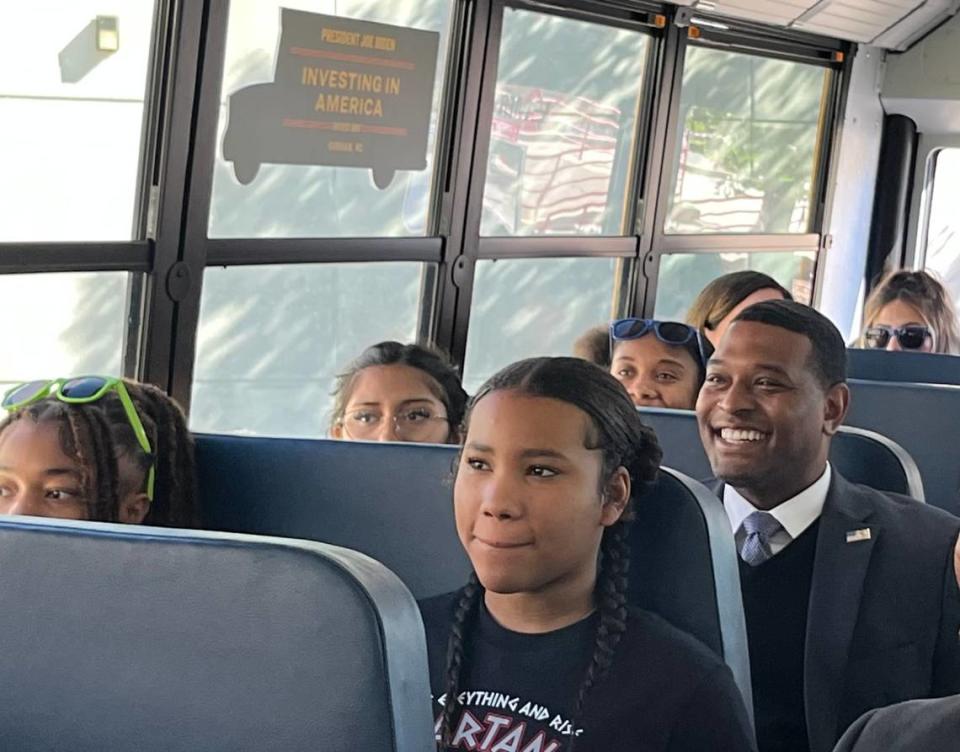The first thing everyone on the yellow school bus departing a Durham high school Wednesday noticed was the noise.
Or rather, because the bus was electric, the lack of it.
“Students don’t have to yell and scream when they’re talking to one another in the morning,” said Mayor Leonardo Williams, a former teacher. “They’re talking, and they’re all loud, and they’re building up this anxiety, and they get to school and they have to get in a quiet classroom where they act up, and the teacher is like, ‘What is wrong with you? Calm down.’”
In fact, the electric buses are so quiet that their High-Point based manufacturer Carolina Thomas equips them with an exterior “noise emitter” so people can hear them approach.
“It’s like a whistle, like a distant train,” said Kelly Rivera, general manager for the company.
Durham Public Schools is receiving 38 electric buses thanks to a newly announced $15 million grant from the Environmental Protection Agency.
“It means cleaner air. It means healthier children,” EPA Administrator Michael Regan said in a news conference. “And it means good-paying American jobs.”
Students from the Southern School of Environment and Sustainability joined Regan, U.S. Rep. Valerie Foushee, and local officials on the test ride Wednesday.
They asked a host of questions:
-
When will the buses arrive? (Next school year, most likely.)
-
Can they accommodate wheelchairs? (Yes.)
-
Can we eat on these buses? (Still no.)

And then, as the ride ended, sophomore Sophia Brown asked earnestly why the electric buses were being brought to Durham. Economic opportunity? To satisfy a legal requirement? As a health care measure? Regan called her question “focused and precise and honest and authentic.”
“You’re exactly right,” he told her. “Sometimes … it sounds like all we’re talking about is infrastructure and charging and how far the bus goes and how much it costs. But the ultimate goal at the end of the day is to make a cleaner environment for you guys as students.”
“We are investing in you,” he said..
Durham desperately needs more school bus drivers
Durham Public Schools, like many districts nationwide, has struggled to hire enough bus drivers. This school year, over 22,000 children — 73% — requested bus rides.
With only 134 full-time drivers and 12 substitutes, DPS doesn’t have enough drivers to make the 823 daily bus routes, leading to some cancellations, according to school planning director Matthew Palmer.
“Starting this week, we have had to reduce service. It is unfortunate, it is painful, and it is unfair,” Palmer told the school board Oct. 10.
The 823 routes include morning and afternoon bus runs, which are staggered by bell schedules that have elementary schools starting at 7:45 a.m., middle schools at 8:30 a.m. and high schools at 9:15 a.m.
The district needs a minimum of 165 full-time drivers to meet the most basic service levels, according to a new report. As of Oct. 18, the transportation department has vacancies for 59 full-time drivers and 13 substitutes.
Palmer will appear again before the school board at 6:30 p.m. Thursday, Oct. 24, with proposed solutions to what he called a “long-term national crisis.”

‘A healthier planet’ and ‘a moment of zen’
Communities across North Carolina have received $70 million to replace 230 buses with electric or low-emission models since the passage of the bipartisan infrastructure law in 2021, according to the EPA.
Regan said the federal government is spending $5 billion on electrifying school buses over the next five years, on top of $3 billion spent since 2022.
“This federal investment in clean transportation will significantly reduce harmful emissions and air pollution, creating a healthier environment and a healthier planet for our students and generations to come,” said Foushee, who voted for the law.
The buses get 125 miles on a single charge, and the district has charging stations for a third of them already installed across the city.
“This will reduce harmful emissions, benefiting our students and staff, particularly those with respiratory conditions,” said Superintendent Anthony Lewis, who has asthma. “These buses will reduce our carbon footprint and improve air quality, not just around our schools, but around Durham.”
EMEA Tribune is not involved in this news article, it is taken from our partners and or from the News Agencies. Copyright and Credit go to the News Agencies, email news@emeatribune.com Follow our WhatsApp verified Channel



